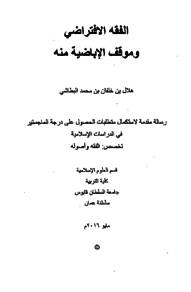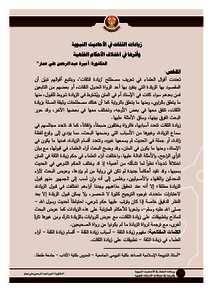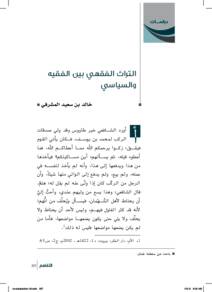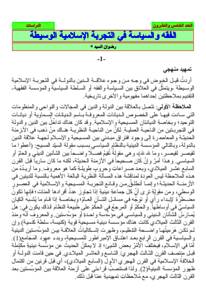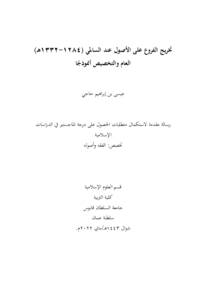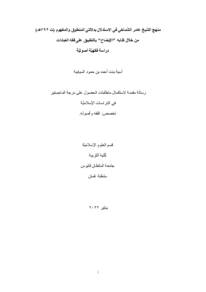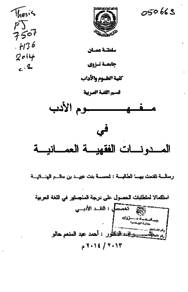Document
الفقه الافتراضي و موقف الإباضية منه
Publisher
جامعة السلطان قابوس
Gregorian
2016
Language
Arabic
English abstract
This study tries to shed some light over a type of fiqh, that predicts and assumes juristic issues which haven't occurred yet in reality. The purpose of the study is to highlight the positive role played by the Ibādī School of Law on the assumptive Fiqh. In addition this study illustrates how intelligent the Ibādī jurists were and how much they were able to anticipate cases which haven't happened in the real world. They would be able to deal with assuemed matters if they happened without hesitation. For instance, many contemporary cases were solved by referring to previous studies and books. Moreover this research shows the characteristics of assumptive fiqh in an Ibādī way. Some aspects of theassumptive fiqh require careful analysis and interpretation. Furthermore, this kind of fiqh has existed for long time. The study provides clear explanation for the following questions: To what extent could one harmonize between what was related of dispraising the assumptive questions on the one hand, and what was related from the scholars themselves that they would assume some anticipated matters? Did the assumptive fiqh restrict Islamic fiqh from developing? How did Ibāờī scholars deal with the assumptive fiqh
The results of this study are as follows: - The assumptive fiqh is defined as a mental process that suggests solutions for cases that have not been seen in the real world, either likely to happen or not. - The fact that the opinions of the scholars across the different schools of law are various does not prevent this kind of fiqh to have practical applications, be it little or be it much. - The assumptive fiqh has had many applications in the Ibā thSchool of Law since the early centuries of Islam, in different juristic chapters. - The fields in which Ibādī jurists assumed more are those which depend on the local customs and norms, such as the issues of: marriage, divorce, vows, oaths, criminal laws, freeing slaves and apostasy.
Description
رسالة جامعية
Member of
Resource URL
Arabic abstract
تسلط هذه الدراسة الضوء على نوع من الاجتهاد الفقهي تميز بالخوض فيما لم يقع من المسائل في عملية افتراضية تمخض عنها كثير من الفروع الفقيهة المبنية على محض التوقع والافتراض، والهدف من هذه الدراسة يكمن بيان حكم الفقه الافتراضي، وإبراز دوره في توقع ما يستجد من مسائل مستقبلية من خلال استشراف المستقبل، وهي بذلك تبرز ما تمتع به فقهاء الفقه الافتراضي من سعة أفق تجاوز الحاضر إلى المستقبل في إشارة إلى فطنتهم الاجتهادية في استشراف نوازل المستقبل للإسهام في بيان حكمها قبل وقوعها، وقد ساعدت هذه الدراسة في بيان سمات الاجتهاد الفقهي لدى فقهاء الإباضية، وكشفت عن منهجهم في تعاطي المسائل الافتراضية ومع أن الفقه الافتراضي قديم من حيث النشأة غير أن جوانب منه ما زالت تحتاج إلى بحث واستقراء، ولذا فإن الدراسة جاءت لتجيب على الأسئلة التالية: ما مدى صحة ما يذكر من أن الفقه الافتراضي نشا متأخرا عن عهود النبوة والصحابة والتابعين؟ وهل صحيح أن أبا حنيفة أول من أحدثه؟ وما هو الراي في حكم الافتراض من خلال النظر في آراء العلماء وادلتهم؟ وإلى أي اتجاه يميل موقف فقهاء الإباضية من الفقه الافتراضي؟ وما انعكاس ذلك الموقف على تطبيقاتهم الفقهية؟ وقد توصلت الدراسة إلى نتائج عدة، أهمها: أن التعريف الأنسب الفقه الافتراضي هو: "عملية عقلية تقتضي تصور مسائل غیر واقعة ممكنة أو مستحيلة يقوم الفقيه بالبحث في حكمها". تباین مواقف علماء المذاهب من الفقه الافتراضي لم يمنع من وجود تطبيقات له في فروع المذاهب المختلفة، وإن تباينت في ذلك قلة وكثرة. . جواز افتراض المسائل وتوقع حدوثها والحكم فيها من حيث الجملة مع مراعاة بعض الضوابط في ذلك • الفقه الافتراضي تطبيقات فقهية عند الإباضية منذ القرون الأولى في عدد من الأبواب الفقهية. . المجالات التي اكثر فيها الفقهاء الإباضية الافتراض كل ما هو عائد إلى أعراف الناس وتصرفاتهم ونياتهم وأقوالهم؛ كبعض قضايا النكاح، والطلاق، والأيمان، والنذور، والجنايات، والحدود، والعتق، والردة.
Category
Theses and Dissertations

